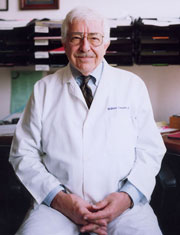Checking
up on Dr. Dement
Q: You taught your last class one year ago. What are you focusing
on these days?
A: When people hear that you're retired from
teaching, the assumption is that you've retired. I've had a lot of
people ask, "How do you like retirement?" But I've been very busy.
I'm now the principal investigator on a grant for a large-scale
clinical trial of a treatment for sleep apnea. It's big,
complicated and demanding. I'm also trying to construct a way to
penetrate the educational system.
Q: How so?
A: I've developed a two-hour course for students in the
dormitories, because we found in surveys that Stanford freshmen had
no sleep education. We present a lively video of things like
cataplexy attacks, narcoleptic dogs and night terrors, and the
students say, "Wow, sleep does have an impact." It's fun for me --
I just bought a golf cart to buzz around to the dormitories.
Q: Why focus on this age group?
A: This is an at-risk population that is accessible and
for the most part has been completely neglected. There are people
working on fatigue in health care and fatigue and drowsy driving
but there is no one doing work in this area. These students are
completely ignorant about sleep. Kids will say to me, "I've heard
of REM sleep -- isn't that a rock group?"
Q: What effect have you had on students?
A: I tell them to get all the sleep they can and listen to
their bodies. The students who do this start to feel great -- they
feel alert and energetic.
Q: Regarding your outreach efforts, what is one of the
most important messages you try to convey to people?
A: That drowsiness is red alert. When people are tired all
the time, that's sleep deprivation -- but they think they're tired
because of a big lunch or too much studying or unrequited love.
There are a lot of myths to dismantle. Ignoring the onset of
drowsiness in hazardous situations can have tragic
consequences.
Q: Switching gears a bit, you founded the Stanford Sleep
Disorders Clinic and Research Center in 1970. How has sleep
medicine changed since then?
A: There are new treatments and a better
understanding of the diseases. Physicians used to be skeptical
about the high prevalence of sleep disorders and even about their
existence, but that's changing. We were all alone in the early
1970s and now there are almost 300 sleep centers. So there's been a
real expansion. I've been very impressed with the second-generation
researchers; it was hard to survive in this field but the
outstanding ones were able to.

|
 William Dement, MD, PhD, the Lowell W. and Josephine
Q. Berry Professor of Psychiatry and Behavioral Sciences, retired
from teaching last March. Medical Center Report called to
learn what the "father of sleep medicine" has been up to
since. William Dement, MD, PhD, the Lowell W. and Josephine
Q. Berry Professor of Psychiatry and Behavioral Sciences, retired
from teaching last March. Medical Center Report called to
learn what the "father of sleep medicine" has been up to
since.
Sleep
legend Dement keeps last class wide awake (3/19/03)
Sleep Disorders Center
|

